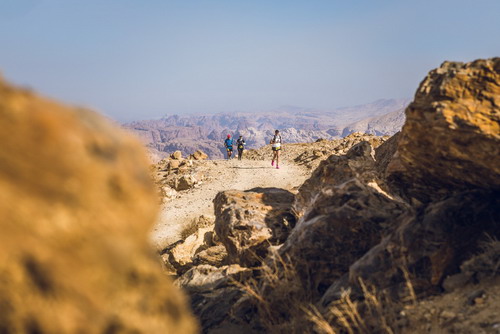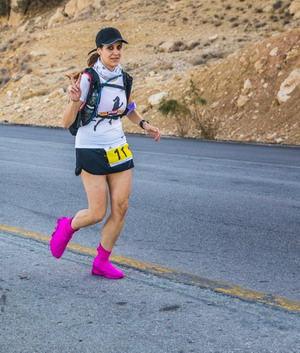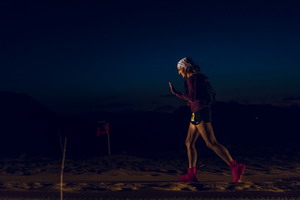Ala Baydoun dedicates her ultra-marathon run in Jordan to raise awareness in the final fight against polio
 Ala Baydoun runs through the Jordanian desert in the Rum International Marathon. Ala dedicated her run to raise awareness for polio eradication. Photo: Ali Barqawi22 January 2018 – It’s just after 6am on a Friday morning in Petra, one of Jordan’s ancient southern cities. Ala Baydoun ties her shoe laces with an extra secure knot as she prepares for what is no normal run. It’s the first day of her weekend and Ala will run for 100km to Wadi Rum in an Ultra Marathon, an effort that she’s dedicated to polio eradication.
Ala Baydoun runs through the Jordanian desert in the Rum International Marathon. Ala dedicated her run to raise awareness for polio eradication. Photo: Ali Barqawi22 January 2018 – It’s just after 6am on a Friday morning in Petra, one of Jordan’s ancient southern cities. Ala Baydoun ties her shoe laces with an extra secure knot as she prepares for what is no normal run. It’s the first day of her weekend and Ala will run for 100km to Wadi Rum in an Ultra Marathon, an effort that she’s dedicated to polio eradication.
Taking her position at the starting line, she looks calm and collected, despite the high altitude and the 8 km of hilly terrain immediately ahead of her.
After a grueling 14-hour run, through the desert, Ala crosses the finish line in second place and cuts more than 2 hours off her personal best time.
“I was injured and wasn’t sure I would finish the race, but I beat my time from last race! As runners we are so cautious of seconds, so to say that I cut 2 hours off is a big deal.”
Ala works for the World Health Organization and says that dedicating the run to ‘end polio’ was important to her.
 Ala hits the pavement every day running anywhere between 10 and 15 kilometres in Amman, Jordan. On a Friday she’ll run between 30 and 35 km. She dedicated her run in the Rum International Marathon to ending polio. Photo: Ali Barqawi“We haven’t seen polio in Jordan now for many years, but it remains a risk because it continues to circulate in countries in the Region. I work with a team of people who are very dedicated to finally ending polio around the world, and I know we are so close. This was a way that I could continue to raise awareness around this cause,” she says.
Ala hits the pavement every day running anywhere between 10 and 15 kilometres in Amman, Jordan. On a Friday she’ll run between 30 and 35 km. She dedicated her run in the Rum International Marathon to ending polio. Photo: Ali Barqawi“We haven’t seen polio in Jordan now for many years, but it remains a risk because it continues to circulate in countries in the Region. I work with a team of people who are very dedicated to finally ending polio around the world, and I know we are so close. This was a way that I could continue to raise awareness around this cause,” she says.
A born runner, Ala hits the pavement every day running anywhere between 10 and 15 kilometres in Amman. On a Friday she’ll run between 30 and 35 km outside the city, which she says is partly out of love and partly to train.
“I’m a road runner by obligation because it’s too far to travel to run regularly in the desert, and completing trail runs in Jordan can be dangerous for a woman running solo. Basically I’d need a group of men running with me and that’s not always possible, nor is it practical.”
This isn’t Ala’s first ultra-marathon and certainly not her first time running through the desert. She’s competed in a number of races and running events in Jordan and overseas, inspired often by her marathon-running father. “Running is in my blood,” she says.
“I remember the first time I started running, when I was about 12 years old and I couldn’t complete 3 kilometres with him. But then we started going out every day, and quickly I got faster and realized how much I loved it.”
Now, she says, that love of running is what keeps her motivated on the big runs.
 Ala says the runners high, when the endorphins kick in’ is what keeps her motivated to keep running during big running events. She placed second in the Rum International Marathon. Photo. Ali Barqawi“You have to motivate yourself, because you’re in the middle of nowhere, often alone. One negative thought in that environment can really derail you. And you’re not only thinking about keeping motivated and positive, you’ve also got other things to be thinking about…like there are stray dogs in the desert and running in the sand requires so much more effort,” she says.
Ala says the runners high, when the endorphins kick in’ is what keeps her motivated to keep running during big running events. She placed second in the Rum International Marathon. Photo. Ali Barqawi“You have to motivate yourself, because you’re in the middle of nowhere, often alone. One negative thought in that environment can really derail you. And you’re not only thinking about keeping motivated and positive, you’ve also got other things to be thinking about…like there are stray dogs in the desert and running in the sand requires so much more effort,” she says.
But she says adrenaline can do wonders. “It’s called the runners high, when the endorphins kick in. I can get into a zone where I totally forget that the lower part of my body is moving. It’s a dream state or something, I don’t know how to explain it”
Besides, Ala says, when you have a strong will and you’re running with a purpose and for a purpose, that’s what will get you over the finish line.
“I don’t want to see more kids paralysed by this disease in my lifetime, so I ran for polio, hoping with every step that we see an end to it very soon.”





